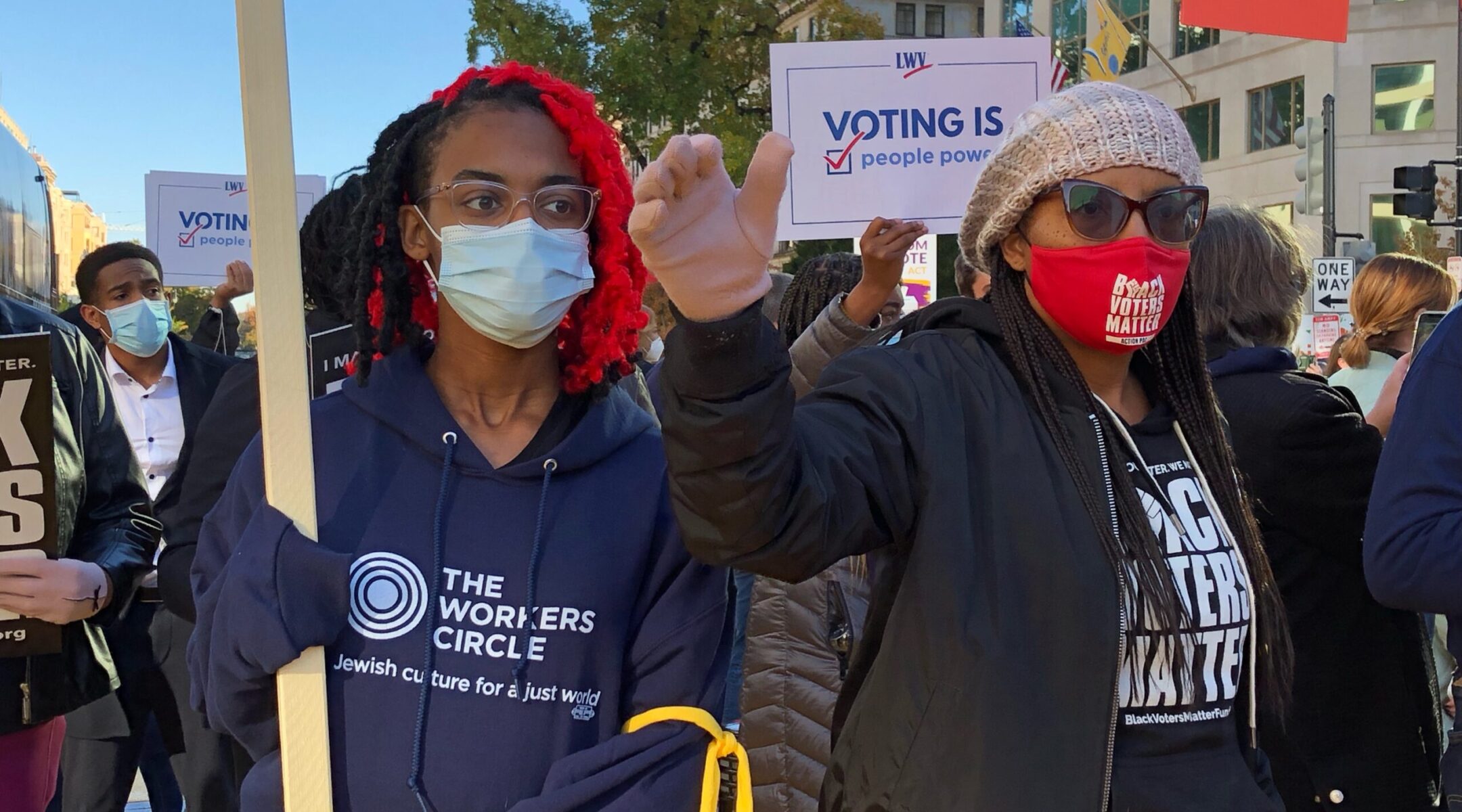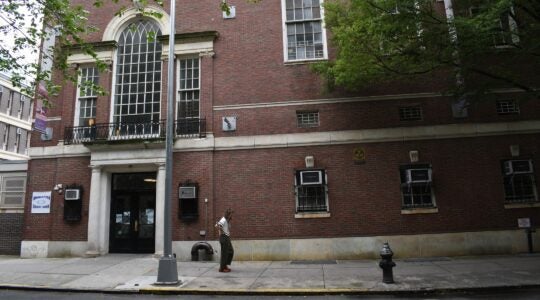(New York Jewish Week) — In late 2021, activists from the Workers Circle, a progressive Jewish group, and the voting rights organization Black Voters Matter gathered outside the White House for a protest.
The protesters — who demanded that President Joe Biden call for the elimination of the filibuster in order to pass voting rights legislation — blocked the sidewalk, singing and chanting, said Noa Baron, who was then a college student activist with the Workers Circle.
“It was one of those things where you feel like and you know you’re doing the right thing,” Baron, now a staffer at the Workers Circle, said of the protest and the then-nascent partnership with Black Voters Matter. “They believe in showing up and we believe in showing up, so all of us have that shared understanding that bringing people and being on the ground is an important part of organizing for democracy.”
Now, even as war between Israel and Hamas has stoked tensions on the left and frayed relationships between some Jews and progressives, the two groups have forged ahead with their partnership. Both feel that their constituencies are threatened by racism and by the prospect of a Donald Trump victory in the 2024 presidential election.
At an annual dinner on Monday night in downtown Manhattan, the Workers Circle honored Black Voters Matter with its Activism Award and announced that the groups were formalizing their partnership. The move will deepen the relationship between the two groups and details will be released next month.
Ann Toback, the Workers Circle CEO, said the strained relationships between different groups due to the war “makes our partnership more important.”
“We need to model to the Jewish community and the Black community that there is so much that still brings us together,” Toback told the New York Jewish Week. “I think there’s a lot of people out there who want to create divisions even when they may or may not exist, and what we’re doing is modeling what it means to be on the ground fighting for something we all believe in.”
Yiddish-speaking Jewish immigrants to the U.S. established the Workers Circle, then called the Workmen’s Circle, in 1900 in New York as a labor and mutual aid organization. The group now runs a robust Yiddish language and culture program, and advocates for progressive causes. In recent years, the group has focused on strengthening democratic and voting rights, Toback said.
As a policy, the national organization stays out of Middle East politics, which has contributed to some friction with other Jewish groups. In August, the Workers Circle left the Conference of Presidents of Major American Jewish Organizations over disagreements about policies in the U.S., discourse on Israel and how to define antisemitism.
And one local affiliate has allied with the left on Israel. In October, the Boston Workers Circle, which is a separate nonprofit, split with the Jewish Community Relations Council of Boston after joining a rally in support of a Gaza ceasefire.
“We were founded by activists who very much believed that you change the world you live in and we’ve always followed that,” Toback said of the decision to stay away from opining on the conflict. She said her group is focused on the possibility of voting rights being curtailed ahead of Election Day next year.
“Our democracy is under attack right now,” she added. “And it’s so important that the American Jewish community understand that, as much as our hearts may be distracted, we can’t take our eyes off what may happen here in 11 months’ time when millions of people may not be able to vote.”
In the immediate aftermath of Hamas’ Oct. 7 attack on Israel, left-leaning Jews said they felt abandoned by former partners. In the days after Oct. 7, multiple Black Lives Matter chapters appeared to praise or endorse Hamas’ attack. Black Voters Matter is a separate group from Black Lives Matter.
More broadly, polls have also shown a divergence between white Americans and people of color in their views on the war, and between Jewish Americans and non-Jews.
The Workers Circle and Black Voters Matter vowed to press ahead with their work despite the war.
“We’ve had plans on launching this partnership for months and so it’s definitely not a response to current events, but we’re not going to not do it because of current events. We’re going to stay focused on what our mission has been,” said Black Voters Matter’s co-founder, Cliff Albright. “When we come together, Black communities do better and Jewish communities do better.”
The two groups both see themselves as threatened by bigotry and voter suppression, and say they are linked by the history of cooperation between the Black and Jewish communities during the civil rights movement. In an homage to that era, the Workers Circle and Black Voters Matter are planning to march together in March at an annual event in Selma, Alabama, marking the historic march in that city for voting rights in 1965.
The two groups will also organize activists from geographically close Jewish and Black communities, starting in Florida, for discussions on issues including book banning, education and health care, Toback said. The two groups and others are co-sponsoring a virtual discussion on voter suppression on Thursday.
Other initiatives include get-out-the-vote projects, combating voter suppression in North Carolina, a summit to talk about organizing for voting rights and “democracy circles” that bring together small groups of activists around the country to examine topics such as gerrymandering.
Noelle Damico, the Workers Circle’s social justice director, said the group had worked together with Black organizations and leaders, including the civil rights activist A. Philip Randolph, since the early 20th century. The Workers Circle supported Randolph’s newspaper, The Messenger, and conducted outreach to Black needleworkers. Randolph helped the group see its labor organizing as a way to advance civil rights, Damico said.
In the civil rights era, Workers Circle members and leaders were deeply active in the movement, she said.
“Some of them were desegregating parks and other public facilities, some of them were involved in the major marches,” including the Selma March and the March on Washington in 1963, Damico said. “It’s been a big part of our history and at this moment it seems really important for us to reclaim that. Not that we forgot it but just to pay special attention at this moment.”
Danielle Brown, the deputy national field director for Black Voters Matter, said the fraught moment was “an opportunity to form bridges.”
“There are so many different things that we could come together around, just in understanding who each other is, understanding each other’s culture, but voting rights is something that’s common,” Brown said. “That’s not a Jewish thing, that’s not a Black thing, that’s something that we need across the board.”
The New York Jewish Week brings you the stories behind the headlines, keeping you connected to Jewish life in New York. Help sustain the reporting you trust by donating today.





